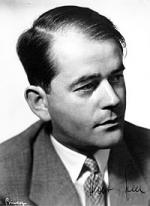Disable ads!
Albert Speer
Berthold Konrad Hermann Albert Speer (German: [ˈʃpeːɐ ] ( listen); March 19, 1905 – September 1, 1981) was a German architect who was, for a part of World War II, Minister of Armaments and War Production for the Third Reich. Speer was Adolf Hitler's chief architect before assuming ministerial office. As "the Nazi who said sorry", he accepted moral responsibility at the Nuremberg trials and in his memoirs for complicity in crimes of the Nazi regime, while maintaining a façade of ignorance. Speer joined the Nazi Party in 1931, launching himself on a political and governmental career which lasted fourteen years. His architectural skills made him increasingly prominent within the Party and he became a member of Hitler's inner circle. Hitler instructed him to design and construct structures including the Reich Chancellery and the Zeppelinfeld stadium in Nuremberg where Party rallies were held. Speer also made plans to reconstruct Berlin on a grand scale, with huge buildings, wide boulevards, and a reorganized transportation system. In February 1942, Hitler appointed Speer Minister of Armaments and War Production. Under his leadership, Germany's war production continued to increase despite considerable Allied bombing. After the war, he was tried at Nuremberg and sentenced to 20 years in prison for his role in the Nazi regime, principally for the use of forced labor. He served his full sentence, most of it at Spandau Prison in West Berlin. Following his release from Spandau in 1966, Speer published two bestselling autobiographical works, Inside the Third Reich and Spandau: The Secret Diaries, detailing his often close personal relationship with Hitler, and providing readers and historians with a unique perspective on the workings of the Nazi regime. He later wrote a third book, Infiltration, about the SS. Speer died of natural causes in 1981 while on a visit to London.
 Read more on wikipedia.org Read more on wikipedia.org
 All quotes by Albert Speer All quotes by Albert Speer
 Edit Edit
|

|
|
|
|
|
Background photo by Giuliana
|